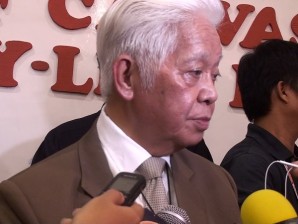MANILA, Philippines – Commission on Elections (Comelec) Chairman Sixto Brillantes Jr. said Thursday that about 18,000 precinct count optical scan (PCOS) machines, or a quarter out of the total 78,000 machines, had experienced transmission problems.
The main cause of transmission problems were corrupted Compact Flash (CF) cards and lack of cellular network coverage, Brillantes said.
“[It’s a mix of problems], but most of these are transmission problems, not the PCOS problems,” he told reporters in an ambush interview. Brillantes added that “18,000 [are around] 24 or 25 percent of the 78,000 PCOS [machines].”
When it comes to transmission problems caused by CF cards, Brillantes said that these were very few compared to the signal problems.
CF cards are storage devices where the election returns are stored from the PCOS machines. The election returns on the CF cards are then transmitted to the city or municipal board of canvassers to go through the ladderized system.
“We knew the areas without signals even before the elections but we did not announce it in public because that will create problems. Now we will announce it, it is more or less 25 percent,” Brillantes said.
“The telecommunications [companies] covered only 63 percent,” he said.
The Comelec had already identified dead spot areas and prepared for contingency plans, such as manually bringing to the city or municipality the election returns stored inside the CF cards, Brillantes said.
“The [official] ladderized results all came in because we prepared to have the [election returns] brought to the local board of canvassers [in areas without signals],” he said.
Poll watchdog, Automated Election System (AES) watch, had issued a statement on May 18, or four days after elections, saying that 18,187 clustered precincts had failed to transmit their results.
“Four days after this year’s election, 18,187 clustered precincts or 23 percent of the total number failed to transmit election returns affecting if not potentially disenfranchising 8.6 million votes,” AES watch said.
